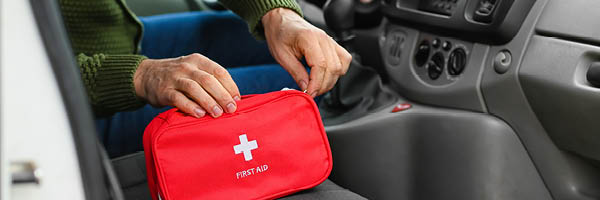
Some items will inevitably end up in your car — an old receipt, a water bottle or this morning’s coffee cup. However, there are certain items you should keep in your vehicle. The specifics can depend on a few factors, including where you live, if you travel frequently and if you’re usually driving solo or always have extra passengers on hand, like kids or a pet.
While not exhaustive, this list of items can help you decide what to keep in your car to prepare you for an emergency or other scenario you might encounter on the road.
1. Documentation.
These items are helpful, or even required by law, to have on hand in your vehicle at all times. Consider keeping your important car documents in a folder and storing it in your glove compartment for easy access:
- Owner’s manual
- Car repair information
- Insurance claim forms
- License, insurance and registration
- Emergency contact information
- Pen and a small notepad
Your cell phone can also be used to store some of this information digitally. Learn more about which emergency numbers and information to save in your phone as well as how to use lock screen options to communicate with first responders if you find yourself in an emergency.
2. Weather-related items.
If you live where it snows, then you know how helpful a snow brush and ice scraper can be during inclement weather. Consider adding these weather-related items to your car depending on your environment:
- Snow brush or ice scraper
- Small shovel
- Cat litter or traction mat
- Extra windshield wiper fluid
- Umbrella
- Windshield sun shade
3. An emergency kit.
Whether you’re new to car ownership or just haven’t had the time to assemble an emergency kit, having some key items on hand can be helpful during a roadside emergency. Take the time to tailor your emergency kit to your needs, your car and your location. Consider storing these items in your trunk to be prepared for an emergency:
- Wheel wrench and car jack
- Portable tire inflator
- Tire pressure gauge
- Spare tire
- WD-40
- Jumper cables
- Clean, empty, refillable gas jug
- Flashlight
- Reflective triangles
- Roadside flares
- Bottled water and nonperishable snacks
- Car charger for your phone
- Fire extinguisher
- First-aid kit
- Multi-purpose tool
- Duct tape
- Blanket or extra clothing
- List of emergency phone numbers (if you don’t keep this with your documents)
Along with items that can help you in an emergency, it’s helpful to have some knowledge on what to do if you find yourself in an unexpected situation. Here are five tips to safely handle a roadside emergency.

Learn about our
Auto Insurance
4. Items for the family.
If you have kids or a pet that you travel with frequently, consider adding items that are tailored to their needs while on the road. This could include:
- Extra blanket(s)
- Extra snacks and water for kids and pets (Pack a fresh water bottle each trip if your car experiences extreme heat or cold)
- A collapsible water and/or food dish for a pet
- Child car seat or booster seat
- Safety harness or crate for your pet
- Extra umbrellas
- Cleaning kit (For example: cleaning solution, paper towels, regular towels, plastic bags, etc.)
In addition to having the right items on hand for your pet, many insurance companies, including Grange Insurance, provide pet injury coverage for your auto policy so your four-legged friend is protected each time you hit the road. Talk to your independent insurance agent to learn whether your car insurance will cover pet injuries in an accident.
5. Miscellaneous.
Some items are just helpful to have at hand when you’re in the car. Stock your car appropriately depending on your unique needs. Some items could include:
- Hand sanitizer
- Disinfectant wipes
- Face mask
- Lip balm
- Face tissues
- Makeup
- Sunglasses
- Gum
- Napkins
- Plastic utensils
- Foam cooler
- Spare change and cash
- Medication (store as directed)
References:
- Cars.com
- Auto Simple
- USA Today
- Centers for Disease Control and Prevention (CDC)
This article is for informational and suggestion purposes only. If the policy coverage descriptions in this article conflict with the language in the policy, the language in the policy applies. Talk to your local independent agent to learn more about Grange’s auto insurance, pet injury coverage or Roadside Assistance coverage.